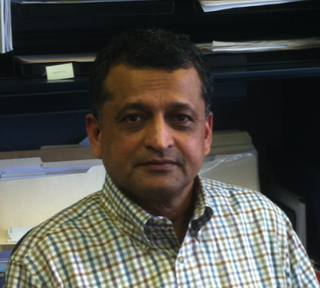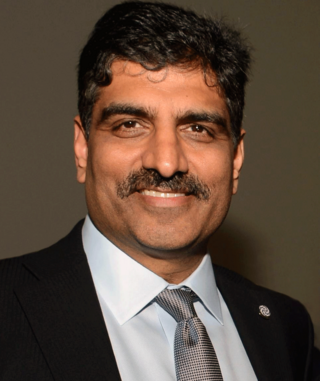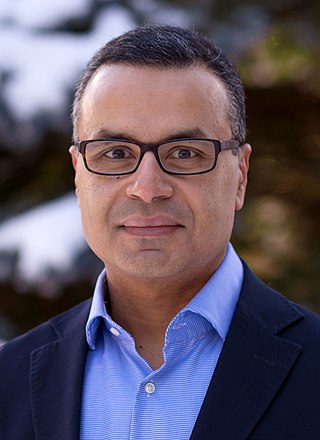
Perimeter Institute for Theoretical Physics is an independent research centre in foundational theoretical physics located in Waterloo, Ontario, Canada. It was founded in 1999. The institute's founding and major benefactor is Canadian entrepreneur and philanthropist Mike Lazaridis.

Computational sociology is a branch of sociology that uses computationally intensive methods to analyze and model social phenomena. Using computer simulations, artificial intelligence, complex statistical methods, and analytic approaches like social network analysis, computational sociology develops and tests theories of complex social processes through bottom-up modeling of social interactions.
Scott J. Shenker is an American computer scientist, and professor of computer science at the University of California, Berkeley. He is also the leader of the Extensible Internet Group at the International Computer Science Institute in Berkeley, California.
Janet Lynne Kolodner is an American cognitive scientist and learning scientist and Regents' Professor Emerita in the School of Interactive Computing, College of Computing at the Georgia Institute of Technology. She was Founding Editor in Chief of The Journal of the Learning Sciences and served in that role for 19 years. She was Founding Executive Officer of the International Society of the Learning Sciences (ISLS). From August, 2010 through July, 2014, she was a program officer at the National Science Foundation and headed up the Cyberlearning and Future Learning Technologies program. Since finishing at NSF, she is working toward a set of projects that will integrate learning technologies coherently to support disciplinary and everyday learning, support project-based pedagogy that works, and connect to the best in curriculum for active learning. As of July, 2020, she is a Professor of the Practice at the Lynch School of Education at Boston College and co-lead of the MA Program in Learning Engineering.
Ronald Cedric Read was a British mathematician, latterly a professor emeritus of mathematics at the University of Waterloo, Canada. He published many books and papers, primarily on enumeration of graphs, graph isomorphism, chromatic polynomials, and particularly, the use of computers in graph-theoretical research. A majority of his later work was done in Waterloo. Read received his Ph.D. (1959) in graph theory from the University of London.

Hiremagalur Krishnaswamy Kesavan, known as H. K. Kesavan, was an Indian professor in the Faculty of Engineering at the University of Waterloo, Ontario, Canada.

Sargur Narasimhamurthy Srihari was an Indian and American computer scientist and educator who made contributions to the field of pattern recognition. The principal impact of his work has been in handwritten address reading systems and in computer forensics. He was a SUNY Distinguished Professor in the School of Engineering and Applied Sciences at the University at Buffalo, Buffalo, New York, USA.
Satish K. Tripathi is an Indian-American computer scientist and academic administrator. He is the president of the University at Buffalo (UB), the flagship of the State University of New York (SUNY) system. Previously he served as Provost of University at Buffalo from 2004 to 2011. From 1997-2004, Tripathi served as dean of the Bourns College of Engineering at University of California, Riverside.

Venu Govindaraju is an Indian-American whose research interests are in the fields of document image analysis and biometrics. He presently serves as the Vice President for Research and Economic Development. He is a SUNY Distinguished Professor of Computer Science and Engineering, School of Engineering and Applied Sciences at the University at Buffalo, The State University of New York, Buffalo, NY, USA.
Madhur Anand is a Canadian poet and professor of ecology and environmental sciences. She was born in Thunder Bay, Ontario and lives in Guelph, Ontario.
Derick Wood (1940–2010) was an English computer scientist who worked for many years as a professor of computer science in Canada and Hong Kong. He was known for his research in automata theory and formal languages, much of which he published in collaboration with Hermann Maurer and Arto Salomaa, and also for his work in computational geometry.

Ihab Francis Ilyas is a computer scientist who works in data science. He is currently a professor of computer science in the David R. Cheriton School of Computer Science at the University of Waterloo. He also leads the Knowledge Platform team at Apple Inc.. Ihab is the holder of the Thomson Reuters-NSERC Industrial Research Chair in Data Cleaning at the University of Waterloo.
Tin Kam Ho is a computer scientist at IBM Research with contributions to machine learning, data mining, and classification. Ho is noted for introducing random decision forests in 1995, and for her pioneering work in ensemble learning and data complexity analysis. She is an IEEE fellow and IAPR fellow.

Cynthia Diane Rudin is an American computer scientist and statistician specializing in machine learning and known for her work in interpretable machine learning. She is the director of the Interpretable Machine Learning Lab at Duke University, where she is a professor of computer science, electrical and computer engineering, statistical science, and biostatistics and bioinformatics. In 2022, she won the Squirrel AI Award for Artificial Intelligence for the Benefit of Humanity from the Association for the Advancement of Artificial Intelligence (AAAI) for her work on the importance of transparency for AI systems in high-risk domains.
Nandita B. Basu is a scientist and professor at the University of Waterloo. Her research is centered on anthropogenic effects on water availability and quality via changes in land use and climate. Basu is recognized for her work on discovering the impact of nutrient legacies and proposed solutions to improving water quality of lakes and coastal zones. She is a member of Robert E. Horton Medal Committee.
Kirsty Elizabeth Helena Penkman is a biochemist and geochemist known for her research in biomolecular archaeology, the use of ancient DNA, amino acid dating, and other biomolecules in order to date fossils and learn about the world as it was in prehistoric times. She is a reader in chemistry at the University of York.

Yuying Li is a Chinese-Canadian professor of computer science in the David R. Cheriton School of Computer Science at the University of Waterloo in Canada. Her research interests include mathematical optimization, scientific computing, data mining, and tail risk in computational finance.

Hanna Wallach is a computational social scientist and partner research manager at Microsoft Research. Her work makes use of machine learning models to study the dynamics of social processes. Her current research focuses on issues of fairness, accountability, transparency, and ethics as they relate to AI and machine learning.
Janusz Boleslaw Pawliszyn is a Polish chemist. He is a Canada Research Chair at the University of Waterloo and Natural Sciences and Engineering Research Council of Canada Industrial Research Chair in New Analytical Methods and Technologies.
Kate S. Larson is a Canadian computer scientist working as a professor, Pasupalak AI Fellow, and University Research Chair in the Cheriton School of Computer Science of the University of Waterloo.








